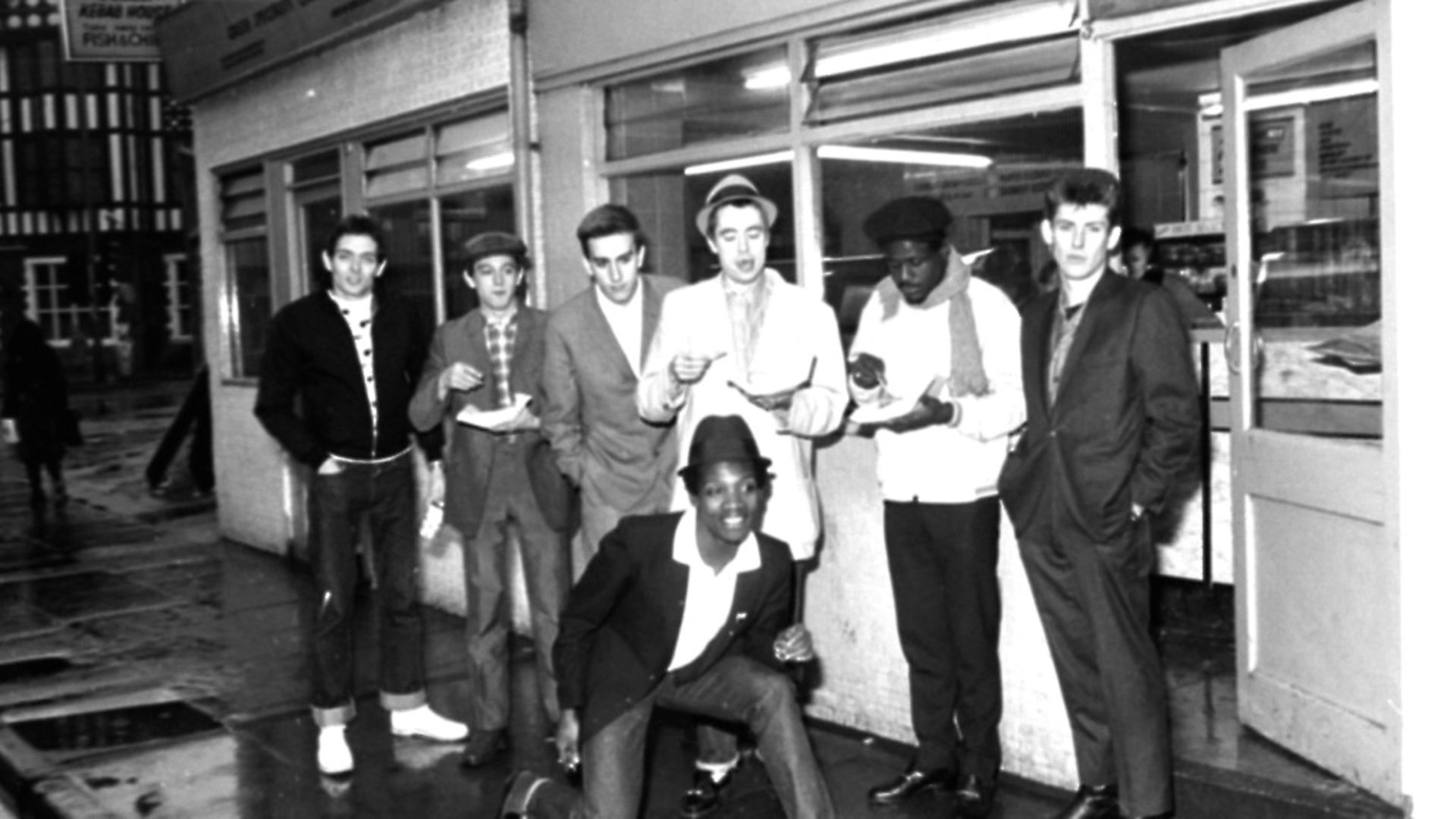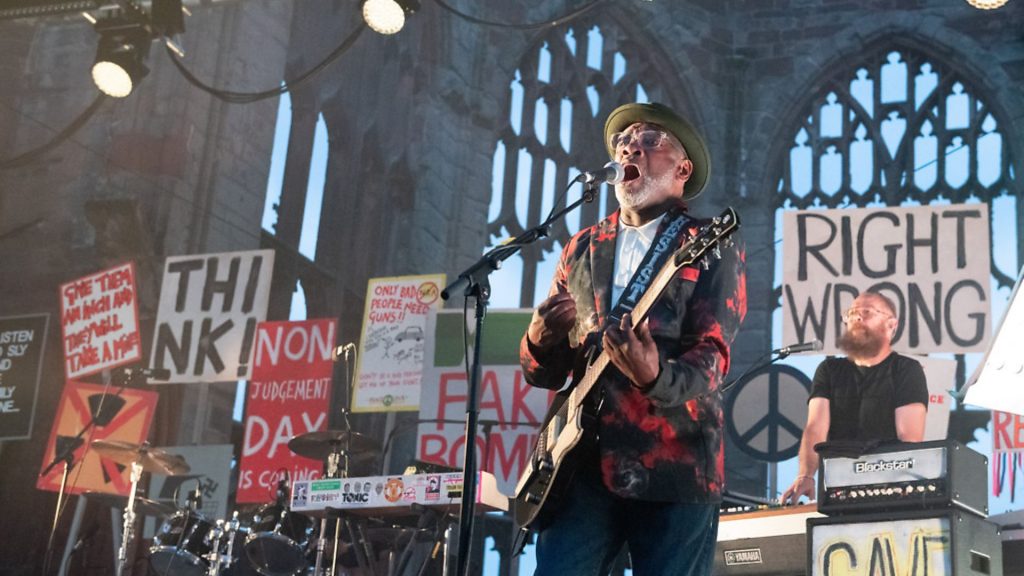
Battered by the bombs and the collapse of its motor industry, the West Midlands hub responded with regeneration through sound. SOPHIA DEBOICK reports.

Coventry has become near-synonymous with the Blitz. The bombing of the night of November 14, 1940, destroyed the medieval city and was one of the most traumatic domestic events of the war. But out of destruction came renewal, as Donald Gibson, appointed Coventry’s first city architect even before the bombings, took this newly wiped-clean slate and created a radical new approach to town planning that would shape the post-war urban landscape not just across Britain but Europe too.
While the pedestrianised city centre was meant to be part of a utopian vision, after the deindustrialisation of a city known for its car industry, the windswept precincts of Coventry would become symbolic of economic decline in the 1970s and 1980s.
Already, in the 1950s, one of Coventry’s most famous sons, Philip Larkin, had dismissed it as a non-place in his poem I Remember, I Remember, saying it was “where my childhood was unspent” and “just where I started”. But for another kind of artist – musicians – roots in Coventry meant something more profound to their work, its history of rebirth and struggle reflected in the music they made.
One of the earliest signs of Coventry’s musical pedigree was the work of Delia Derbyshire of the BBC Radiophonic Workshop, who grew up in the city during the war years. Her 1963 theme music for Doctor Who seemed to be the aural counterpart to Sir Basil Spence’s space-age Coventry cathedral, consecrated the previous year and built next to the bombed-out ruins of the 14th century original. Just as that modernist masterpiece grew out of destruction, Derbyshire remarked that her “love for abstract sounds” came from the soundscape of the Blitz.
At the end of the next decade, a very different sound from Derbyshire’s ethereal electronica was exploding out of Coventry. The Specials’ unlikely blending of high-energy Jamaican ska and a very British deadpan take on both political injustice and the banal everyday created a musical revolution as the 1970s rolled over into the 1980s.
It was a fusion that was down to Coventry’s industrial history, which depended on cheap immigrant labour, often from the Caribbean, and the economic travails of its post-industrial years, when unemployment and racial tensions hit the young hardest of all.
In a whirlwind of less than two years, the multi-racial Specials ruled the charts with their danceable, political singles which spoke to the concerns of British urban youth with an intelligence and pop sensibility that outstripped punk, and they deservedly remain Coventry’s most celebrated musical export.
Today, the city honours them with plaques at key sites, from the Mr George nightclub in the precinct where the band, then named The Automatics, played an early residency, to the Heath Hotel on Foleshill Road, north of the city centre, site of their maiden gig.
The now demolished Horizon Studios on Warwick Road, a stone’s throw from the King Henry VIII grammar school attended by The Specials’ driving force, Jerry Dammers (Larkin went there too), was key in the band’s history. It was there they recorded their debut single, Gangsters, which they put out on their own label, 2 Tone, in May 1979. With a B-side by The Selecter, soon to be fronted by radiographer at Coventry’s Walsgrave Hospital, Pauline Black, the release resulted in a signing by Chrysalis Records, who knew a good thing when they saw it, and continued to use the 2 Tone label, its cartoon rude boy and checkerboard stripe as instantly iconic as the hyperactive on-stage presence of Jamaican-born Neville Staple contrasting against Terry Hall’s moping quiet menace.
Gangsters reached No.6 in the charts on its re-release in the autumn of 1979 and was rapidly followed by the Dandy Livingstone cover, A Message To You Rudy, which peaked at an unjustifiably low-achieving No.10 the same week in November that The Selecter’s On My Radio got to No.8.
A whole new sound had been unleashed on the post-punk charts and, as the 2 Tone stable expanded from humble beginnings at Jerry Dammers’ flat near the railway line on Coventry’s Albany Road to a wholesale musical movement, Specials bass player Horace Panter was not far off the mark in saying “we sat up in Coventry thinking of ourselves as the UK’s Tamla Motown”.
Coventry’s Locarno, the ballroom opened by Mecca in 1960, had been key to the pre-history of 2 Tone and would be a presence at its demise too. Coventry-born Pete Waterman, The Specials’ first manager, had met Neville Staple there when working as its resident soul and reggae DJ (his Soul Hole Records, on the central Hales Street, would also be an important location in Coventry’s music history).
The Locarno was also the venue for the recording of the B-side of the band’s first No.1, 1980’s Too Much Too Young, a ferocious bit of social commentary about teenage pregnancy (“Ain’t he cute?/ No he ain’t/ He’s just another burden/ On the welfare state”).
After three more Top 10 hits, Ghost Town hit No.1 in the summer of 1981, and its B-side, Friday Night, Saturday Morning was a sardonic take on Coventry night life, namechecking the Locarno directly. Ghost Town was recorded as the Brixton riots of April were ongoing and referenced the “fighting on the dancefloor” caused by far-right gangs, but it was also both a doom-laden hymn to an economically floundering city and the swansong of a band that was breaking up.
Hall, Staple and guitarist Lynval Golding splintered off from The Specials to form the Fun Boy Three in late 1981, embracing pop with two Top 5 hits with Bananarama, and the 1980s would be a decade when Coventry did a good line in brilliant but short-lived pop acts. Hazel O’Connor, daughter of a Coventry car plant worker, saw three of her punk-pop masterpieces from the 1980 rags to riches rock movie, Breaking Glass, in which she starred, go Top 10.
The band, King, meanwhile, emerged from Coventry’s 2 Tone scene, initially in the form of the Reluctant Stereotypes, an experimental outfit with a ska backbone, and they had enjoyed airings on John Peel’s radio show and The Old Grey Whistle Test. But it was when they met Perry Haines, the fashion designer and video director behind both Duran Duran’s winning sartorial approach and the taste-making i-D magazine, that they really took off. Haines gave the band both a makeover and a gimmick, kitting them out in Dr. Martens boots, seeking to capitalise on the 1980s zeitgeist – style over substance – and for a brief moment they threatened to become something very big indeed.
King’s 1985 debut single Love and Pride was an undisputed pop gem and was only kept off No.1 by the tenacity of Elaine Paige and Barbara Dickson’s I Know Him So Well. Frontman Paul King, a former drama student who had once earned a crust singing at the medieval banquet knights at Coombe Abbey, outside Coventry city centre, had pop star charisma in spades. But despite the inevitable success in Japan, they only managed one other UK Top 10 and shuffled out of view after a little over a year, with Paul King’s solo work making hardly any impression on the charts and seeing him instead take up a career as a music TV presenter. Despite being a flash in the pan, King were emblematic of the vibrance and flamboyance of 1980s pop.
Coventry would have a number of short-lived acts from the late 1980s into the 1990s and beyond who nonetheless made a big, if brief, impression. Paul Sampson of the proto-King Reluctant Stereotypes was co-producer of indie band the Primitives’ No.6 album, Lovely, and their compellingly cutesy jangle pop single Crash, a No.5 hit in early 1988.
Sampson was well-known enough as a producer by the late 1980s that the Stone Roses wanted him to produce their 1989 debut LP, and the Primitives were briefly music press darlings, Melody Maker describing them as “the perfect band who have just about made the perfect single”. Morrissey was even photographed wearing a t-shirt featuring the cover art of their 1987 single, Stop Killing Me.
Ten years later, Coventry-born Billie Myers had a gargantuan transatlantic hit with Kiss the Rain before losing profile, and ten years after that, in a rather different vein, The Enemy’s warmed-over Jam material was fleetingly popular, with a No.1 album in We’ll Live and Die in These Towns and a No.4 single in the shouty Had Enough.
But Coventry has proved it can do longer-lived and underground too, offering some challenge to Birmingham’s title as the Home of Metal with founding member of grindcore pioneers Napalm Death, Nicholas Bullen, going to King Henry VIII School, and early vocalist with the band, the Coventry-born Lee Dorrian, going on to form doom metal kings, Cathedral. Death metal and early grindcore band Bolt Thrower, formed in 1986, add to Coventry’s metal cred.
In the run-up to Coventry’s year as City of Culture 2021, much emphasis has already been placed on The Specials, including four gigs at the ruined Coventry Cathedral to celebrate the 40th anniversary of 2-Tone earlier this year. In these events that brought together the city’s two most well-known icons in a celebration of both the distant and recent past, Coventry was highlighted as a city marked by history but, in its music at least, that is always looking forward.










